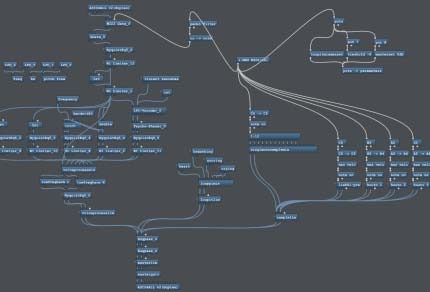

This is not intended as a criticism, it just isn’t a standard DAW.

Though it includes modules for basic sequencing, as well as recording and/or playing back audio and MIDI, none of this works like it does in a “standard” DAW. The help file includes descriptions of all the included modules, and there are some good examples included with the program to give you an idea of what’s possible. Connectors on the modules themselves show their function/label in the status bar when moused over, which is handy. I have not tested how deep you can go with this pluginception (sorry, had to be done)Įverything connects with virtual cables, which are color-coded according to function (audio, MIDI, etc.). It can also be loaded into other hosts as a VST or VSTi plugin itself, and that plugin can also load plugins. The low level “bidules” (their word for modules) make me kind of imagine it as a sort of digital Radiophonic Workshop with modern conveniences such as VST plugins and instant recall via file management. However, it is also a rather capable DSP environment, almost along the lines of SynthEdit or Reaktor, though not quite as deep– but also not as “high level” as, say, Reason, which is still modular, but doesn’t really let you build stuff in the same way. Basic recording setup, with several inputs from an audio interface being mixed and recorded.Īt the most basic level, Bidule is a modular VST host/DAW.

#PLOGUE BIDULE SERIES#
That’s the kind of thing I want to cover in this series of articles, and this seemed like a great place to start, especially since a new version has been released fairly recently (link below). Anyway, for some people, myself among them, I think Bidule is the kind of thing that fits into a particular niche quite well. While there are definite similarities, I don’t really see Bidule as the same kind of thing, but again, more on that later. For some that do, they might prefer something more like Reaktor. It’s not really designed to be a “press record and go” type of DAW, and not everyone has a use for a modular DSP environment. Bidule has been a regular part of my audio life for years, and although it took some getting used to, there’s really nothing else like it.īeside lack of marketing, I think the main reason this program doesn’t get much attention is that it’s not the kind of thing everyone needs, or even wants. I’m not sure how much of that will be addressed, but there’s nothing that ruins it for me, so I don’t really care either. There is also room for improvement in ease-of-use type stuff, which I’ll cover more later. Being a modular, multi-purpose kind of program though, there’s always room for more. I gather there are more planned features, but as it is, it’s more than usable, and has so many features I couldn’t possibly cover them all here. It’s still technically in beta, but I seldom come across a bug or crash (except under certain circumstances, see below). The new paradigm of computer audio can be summed up in two words: "real-time" and "modular" ? both of which are embodied by one application.Plogue’s Bidule has been around for quite some time, it seems like I first downloaded an alpha version well over 10 years ago. As he performs, a musician decides to add an LFO to a synth's filter cutoff knob, where no LFO existed before. It gets better: A sound is broken down into 256 individual bands, then each is tweaked one at a time in a unique way.

Old hat, right? Now, imagine this: the same single output socket sprouting no less than eight different cables connecting eight different effects. Elsewhere, a MIDI cable links a MIDI input to a synthesizer, which is in turn connected to a mixer. More cables connect the effect to a mixer. Is this a familiar picture? Cables lead from a microphone input into a small digital effect.


 0 kommentar(er)
0 kommentar(er)
